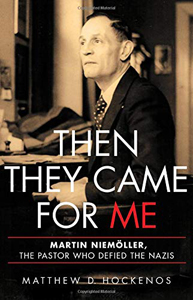 Matthew D. Hockenos, Then They Came for Me; Martin Niemöller, The Pastor Who Defied the Nazis (New York: Basic Books, 2018), 322pp.
Matthew D. Hockenos, Then They Came for Me; Martin Niemöller, The Pastor Who Defied the Nazis (New York: Basic Books, 2018), 322pp.
It's been said that we want our heroes without blemishes and our villains without redemption. Matthew Hockenos calls his biography of the German Lutheran pastor Martin Niemöller (1892–1984) "revisionist" precisely in order to repudiate this dangerous temptation. The title of his book comes from Niemöller's famous poetic confession, the exact origins of which remain a mystery:
First they came for the Communists, and I did not speak out – Because I was not a Communist.
Then they came for the Trade Unionists, and I did not speak out – Because I was not a Trade Unionist.
Then they came for the Jews, and I did not speak out – Because I was not a Jew.
Then they came for me – and there was no one left to speak for me.
As Hockenos shows, by his own admission, and for a long time, resistance is exactly what Niemöller did not do.
Martin Niemöller was both deeply Christian and fervently nationalist. For him there was a connection between throne and altar, patriotism and spirituality. Serving in the navy for nearly ten years as a submarine commander in World War I fulfilled a childhood dream. After Germany's humiliating defeat, he detested the liberal, democratic Weimar Republic. He voted for Hitler and the Nazi Party twice (1924, 1933). He longed for the good old days of the traditional monarchy. Even when he was imprisoned he volunteered to rejoin the German military in World War II. And while he eventually did spend eight years in prison as Hitler's "personal prisoner," that was only because he objected to Hitler's interference in the Lutheran church; he had little to say about his treatment of Jews, or his economic, domestic, or foreign policies.
Only around 1933 to 1934 did Niemöller begin to repudiate his ultranationalist and antisemitic views, and articulate his personal responsibility for not resisting more, along with the collective guilt of the entire nation for the Holocaust. And so two times in his biography Hockenos tells the story of how in 1945 Niemöller took his beloved wife Else back to Dachau to show her the cell where he had been imprisoned. There they saw a simple plaque that read, "Here in the years 1933 to 1945, 238,756 people were cremated." Niemöller later recalled that when he read the plaque "a cold shudder ran down my spine." It wasn't just the number of people murdered that haunted him, he said, it was the dates. Dachau opened in 1933. At that time Niemöller was a free man and a prominent pastor. "My alibi accounted for the years 1937 to 1945," he said, "but God was not asking me where I had been from 1937 to 1945 but from 1933 to 1945… and for those [earlier years] I did not have an answer."
And yet Niemöller did change, even radically so compared to his earlier self. In his later years he became an ardent pacifist and a world traveler as an ecumenical ambassador. His message by that time was threefold: "the futility of war, the importance of church engagement in public affairs, and the need to build a worldwide Christian brotherhood." (237).
Dan Clendenin: dan@journeywithjesus.net


